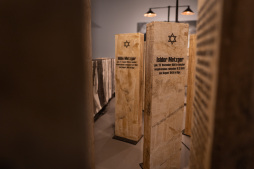
© Stadt Bocholt
In impressive pictures, the exhibition "And they were our neighbours" in Bocholt focused on the fate of Jews who were deported to the ghetto in Riga and murderedRiga Committee: City alliance turns 25 years old
Unique association keeps the memory of Jewish fellow citizens alive in their home towns and in Latvia
On 23 May 2000, 13 major cities founded the German Riga Committee together with the Volksbund Deutsche Kriegsgräberfürsorge e. V. (German War Graves Commission) in Berlin. 25 years later, 80 cities belong to this alliance, which is unique in Europe for its culture of remembrance. The city of Bocholt has been a member since 2001.
Düsseldorf will be the setting on Tuesday, 20 May, when the founding and development of the committee, which also includes Brno, Prague, Riga, Theresienstadt and Vienna, takes centre stage. Its aim is to commemorate the more than 25,000 Jewish citizens who were deported to Riga in 1941/42 and the vast majority of whom were murdered there in the Bikernieki forest.
In its work, the German Riga Committee is also connected to the more than 26,000 Latvian Jewish victims of the Riga ghetto who were murdered on "Riga Bloody Sunday" (30 November 1941) and in the days that followed in Rumbula in order to create "space" there for the people deported from the German Reich.
The first task of the alliance of towns was therefore to establish a dignified burial and memorial site for the victims. The site in the Bikernieki forest was inaugurated on 30 November 2001 - on the 60th anniversary of "Riga Bloody Sunday" and 60 years after the start of the deportations from Germany.
Today, 80 cities belong to the Riga Committee. "Local research has made it visible in many places that Jewish fellow citizens were deported to Riga", says Stefan Dworak, co-initiator and Deputy Secretary General of the Volksbund. "The commemoration of the victims of the Holocaust thus has a concrete local reference and is less abstract."
The Riga Committee has initiated many other local remembrance projects and at the same time made cross-border and cross-cultural remembrance possible. "Many member cities organise this remembrance in a diverse and, above all, lively way. Delegations from the committee and youth groups regularly visit the graves and memorials in Riga."
The keynote speaker on 20 May will be FAZ editor Lorenz Hemicker, who has published a book on the events in Riga entitled "My Grandfather, the Perpetrator". From Tuesday, the Riga Committee's exhibition "RIGA: DEPORTATIONS - TATORTE - ERINNERUNGSKULTUR" can also be seen in the Düsseldorf State Parliament. The Volksbund Deutsche Kriegsgräberfürsorge e. V. continues to be one of the most important players in the alliance.
Further information on the Riga Committee can be found at: www.riga-komitee.eu
About the German War Graves Commission
The Volksbund Deutsche Kriegsgräberfürsorge (German War Graves Commission) is a non-profit organisation that searches for war dead abroad on behalf of the German government, recovers them and buries them with dignity. More than 10,000 were buried last year. The organisation cares for their graves in 45 countries and looks after their relatives. It reaches around 38,000 young people every year with its youth and educational programmes. The organisation urgently needs membership fees and donations to carry out its work.


